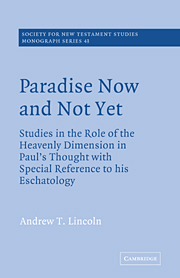 Paradise Now and Not Yet
Paradise Now and Not Yet Book contents
- Frontmatter
- Contents
- Preface
- Abbreviations and note on the text
- Introduction
- 1 Galatians and the heavenly Jerusalem
- 2 1 Corinthians and heavenly existence
- 3 2 Corinthians, the heavenly house and the third heaven
- 4 Philippians and the heavenly commonwealth
- 5 Colossians and heavenly-mindedness
- 6 Ephesians and heavenly life in the Church at worship
- 7 Heaven and the eschatological perspective in Pauline thought
- Notes
- Bibliography
- Index
3 - 2 Corinthians, the heavenly house and the third heaven
Published online by Cambridge University Press: 03 November 2009
- Frontmatter
- Contents
- Preface
- Abbreviations and note on the text
- Introduction
- 1 Galatians and the heavenly Jerusalem
- 2 1 Corinthians and heavenly existence
- 3 2 Corinthians, the heavenly house and the third heaven
- 4 Philippians and the heavenly commonwealth
- 5 Colossians and heavenly-mindedness
- 6 Ephesians and heavenly life in the Church at worship
- 7 Heaven and the eschatological perspective in Pauline thought
- Notes
- Bibliography
- Index
Summary
The polemical setting in the Corinthian correspondence
The two passages in 2 Corinthians in which the concept of heaven figures prominently are 4: 16 – 5: 10 which speaks of the believer's ‘heavenly house’ and 12: 1–10 which relates Paul's experience of the third heaven or Paradise. Although chapters 10–13 in all probability form a separate and later letter, there is a continuity in life-setting between the two passages. Chapters 10–13 indicate that the innuendoes and criticisms to be found in a number of places in the earlier chapters have now become an outright calling into question of Paul's apostolic claims combined with an attempt by the agitators to supplant his claims by their own. It would seem that at some time after the sending of 1 Corinthians new agitation had been caused by a group coming to Corinth but had been temporarily lulled by Paul's severe letter. Later, after the further letter, 2 Corinthians 1–9, had been received, there was a renewed effort (perhaps a return to Corinth) by these opponents, which undid Paul's conciliatory work and provoked his full-scale counter-attack of 2 Corinthians 10–13. In this way 2 Corinthians 5 and 2 Corinthians 12 have the same opposition in view but at two different stages of development.
The main issue at stake between Paul and his opponents is the nature of apostleship and its accompanying life-style. They emphasize visible manifestations of glory and appear to believe that Paul's suffering and weakness veil the gospel (cf. 4: 3).
- Type
- Chapter
- Information
- Paradise Now and Not YetStudies in the Role of the Heavenly Dimension in Paul's Thought with Special Reference to his Eschatology, pp. 55 - 86Publisher: Cambridge University PressPrint publication year: 1981
